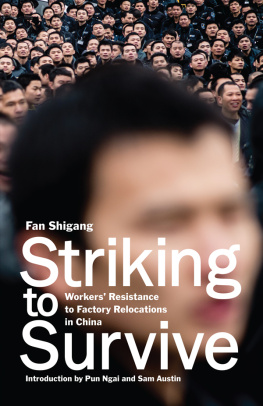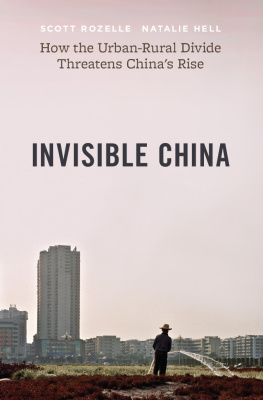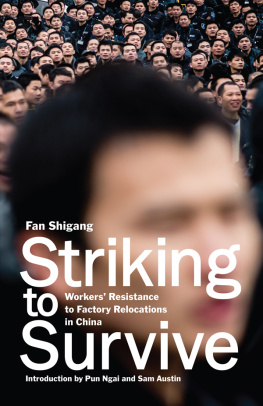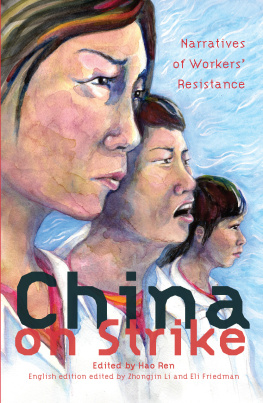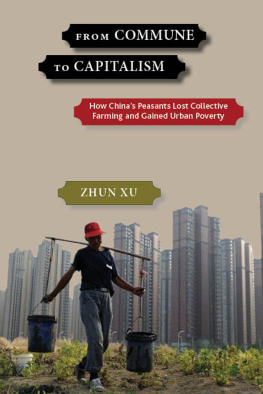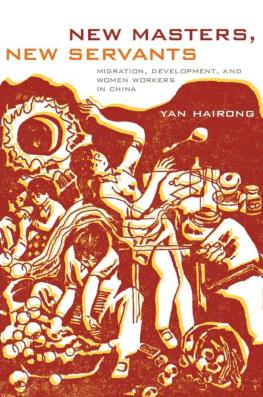Publication of this book was made possible in part by a grant from the Chiang Ching-kuo Foundation for International Scholarly Exchange.
2017 by the University of Washington Press
Printed and bound in the United States
Composed in Minion Pro, a typeface designed by Robert Slimbach
21 20 19 18 17 5 4 3 2 1
All rights reserved. No part of this publication may be reproduced or transmitted in any form or by any means, electronic or mechanical, including photocopy, recording, or any information storage or retrieval system, without permission in writing from the publisher.
UNIVERSITY OF WASHINGTON PRESS
www.washington.edu/uwpress
Library of Congress Cataloging-in-Publication Data
Names: Zavoretti, Roberta, author.
Title: Rural origins, city lives : class and place in contemporary China / Roberta Zavoretti.
Description: Seattle : University of Washington Press, [2017] | Includes bibliographical references and index.
Identifiers: LCCN 2016002919 | ISBN 9780295999241 (hardcover : alk. paper)
Subjects: LCSH: Social classesChina. | Rural-urban migrationSocial aspectsChina. | Migrant laborChina. | ChinaSocial conditions2000-
Classification: LCC HN740.Z9 S619982 2017 | DDC 305.5/130951dc23
LC record available at http://lccn.loc.gov/2016002919
The paper used in this publication is acid-free and meets the minimum requirements of American National Standard for Information SciencesPermanence of Paper for Printed Library Materials, ANSI Z39.481984.
This book is dedicated to the memory of my grandparents, who traveled far in search of a better life.
Acknowledgments
THIS BOOK IS THE PRODUCT OF MANY DISPLACEMENTS. HERE below I make an attempt to thank at least some of the many people who have helped me to make sense of things during these experiences. My first thanks go to all those people who shared with me their lived experience during my time in China; in order to protect their privacy and safety they have all been anonymized, and none of them will be named here. Place names have been replaced with fictitious ones and minor ethnographic details have been omitted or modified to prevent the identification of the people mentioned in the book.
The UK Arts and Humanities Research Council provided essential funding for this ethnographic project. I completed the last stage of writing at the Max Planck Institute for Social Anthropology in Halle Saale, Germany; Chris Hann, director of the Resilience and Transformation in Eurasia Department, enabled me to use the Institutes facilities and to devote precious time to this project. I would like to thank Berit Westwood, Anke Mayer, and Bettina Mann for their kind support, and Jutta Turner for dealing with the challenges of representing China on a map.
In London, Kevin Lathams readiness to listen and share his knowledge, experience, and critical thinking have been an inspiration to me since the very beginning of this project. Caroline Osella, Jakob Klein, Trevor Marchand, and Lola Martinez provided me with much needed support and advice. I am also indebted to Deniz Kandiyoti for her encouragement, and to the late Elisabeth Croll whose vigor and cleverness inspired me both before and after I had the chance to meet her.
I am deeply indebted to the Department of Sociology of Nanjing University, which hosted me during fieldwork and eventually became a second home for me. I am grateful to Stephan Feuchtwang for introducing me to the department and sharing his stimulating ideas with me. Many people at Nanjing University have helped me in many ways. Zhou Xiaohong accepted my application for a visiting fellowship and supported me during two subsequent ethnographic projects; Fan Ke provided precious suggestions and much-needed printed material in Nanjing; Zhu Hong offered me fieldwork advice and connections. I owe a very special thanks to Zhou Peiqin, who made my trips to Nanjing possible and my time there so pleasant. Our friendship has been and still is one of the most cherished outcomes of this research project.
The owners of the Sweet Land Bakery and Caf in Nanjing welcomed me as a researcher in their companys establishments and introduced me to their staff; I am deeply grateful for their openness, trust, and kind assistance. A big thank you goes to Lu Yuan for his much-needed help, wit, and warmth; to Zhang Wen for reminding me that ideals must be pursued by walking on the ground; and to Jing Ruie for her irony and delicious Korean dishes. I feel privileged for having been able to share time, thoughts, and friendship with Chen Liang and his family.
I am grateful to Kate Muessig, Maria Ruiz Cipres, and Antonio Merchant for privileging me with their kindness, patience, intelligence, and humor. I would have not made it without you. Special thanks go to Laurence Dumont for bringing me back to London in 2008. And to friends who, whether near or far away, were always close in mind and spirit: Raquel Fernandez Costa, Jaime Monteiro, Lucia Osso, Dorothe Rihal, and Arianna Zuiani.
Back from China, I was lucky to receive encouragement and inspiration from productive conversations with Li Zhang, Andrew Kipnis, and Stevan Harrell, as well as much-needed advice from Frank Pieke and Ruth Mandel. Friends across the continent gave me invaluable help over the years; among them I am able to mention only a few: John Spall, Anne-Line Rodriguez, Brendan Donegan, Giulia Battaglia, Hans Steinmller, Tullio Lobetti, Daria Trentini, Shireen Mirza, and Ka-Kin Cheuk. In Halle, many colleagues have offered priceless guidance and encouragement while I was working on this project. John Eidson and James Carrier have been precious mentors during the revising process. Nina Glick-Schiller privileged me with her company and stimulating thinking. Minh Nguyen provided me with unfailing support, and Kirsten Endres taught me much through her presence. Miriam Franchina, Wang Ruijing, and Zhang Fan formed a Chinese-Italian connection that brought me invaluable warmth during the cold winters in Halle. When back in Italy, I was able to write this book also thanks to the forbearance of my mother, Viviana Ciroi, and the encouragement of her partner, Francesco Pantarotto. I am grateful to Christian Henriot and Jean Pascal Bassino for hosting me cheerfully in Lyon, and to Caroline Grillot for sharing with me her time and thoughts across Europe, to and from China. In Paris, Catherine Capdeville welcomed me in a vibrant research circle, while Genevieve de Beco and Mlie Chen made me feel at home in the city of lights. In Berlin, Katrin Seidel, Janine Moritz, and Shakira Bedoya Sanchez provided me with a cherished refuge. In Cologne, Susanne Brandtstdter and Jean-Baptiste Pettier offered friendship and advice. A formal thank you could never repay the friendship I received from Aga Pasieka, Anas Mnard, Friederike Stahlmann, Josh Stenberg, Sayana Namsaraeva, Eeva Keskla and Soledad Jimnez Tovar.
Finally, I wish to thank the staff and the collaborators of the University of Washington Press for all the energy and enthusiasm they invested in this project. It was a pleasure to work with Lorri Hagman and Nancy Cortelyou, who could have not been more helpful or professional. I would also like to thank the two anonymous reviewers for their careful reading and most insightful comments.




